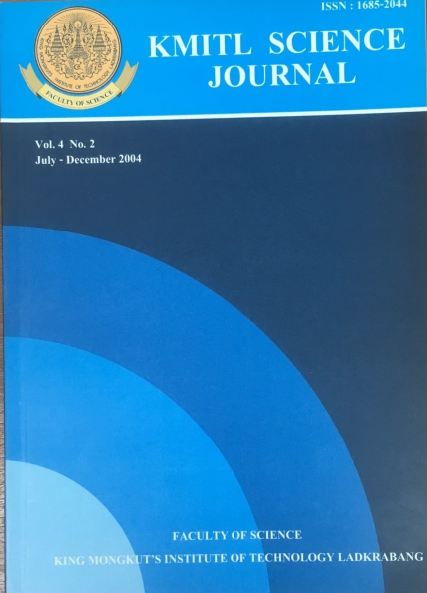The In-Vitro Antibacterial Activity of Some Iranian Essential Oils on Bacillus cereus and Staphylococcus aureus
Main Article Content
Abstract
Medicinal plants contain numerous biologically active compounds, many of which have been shown to have antibacterial properties. In this study, the antibacterial effect of the essential oils of thyme (Thymus vulgaris L.), peppermint (Menthae piperita L.), fennel (Foeniculum vulgar MILL) and caraway (Carum carvi L.) were studied for the activity against Bacillus cereus and Staphylococcus aureus. The essential oils of thyme (Thymus vulgaris L.) inhibited the growths of Staphylococcus aureus and Bacillus cereus, with MIC ranging from 25 to 50µg/ml.
Keywords: Essential oil, Staphylococcus aureus, Bacillus cereus, Antibacterial activity, MIC
Corresponding author: E-mail: aroiee_h@yahoo.com
Article Details
Copyright Transfer Statement
The copyright of this article is transferred to Current Applied Science and Technology journal with effect if and when the article is accepted for publication. The copyright transfer covers the exclusive right to reproduce and distribute the article, including reprints, translations, photographic reproductions, electronic form (offline, online) or any other reproductions of similar nature.
The author warrants that this contribution is original and that he/she has full power to make this grant. The author signs for and accepts responsibility for releasing this material on behalf of any and all co-authors.
Here is the link for download: Copyright transfer form.pdf
References
[2] G.J.E. Nychas, Natural Antimicrobials from Plants. In G. W Gould, New Methods of Food Preservation, London Blackie Academic Professional, 1995, 58-89.
[3] P.S. Mead, L. Slutsker, V. Dietz, L.F. McCaig, J.S. Breese, C. Shapiro, P.M. Griffin, and R.V. Tauxe, Food Related Illness and Death in the United States, Emerg. Infect. Dis., 5, 1999, 607-625.
[4] M.M. Cowan, Plant Products as Antimicrobial Agents, Clinic. Microbiol. Rev., 12, 1999, 564-582.
[5] D.E. Conner, and L.R. Beuchat, Sensitivity of Heat-stressed Yeasts to Essential Oils of Plants, Appl. Environ. Microbiol., 47, 1984a, 229-233.
[6] D.E. Conner, and L.R. Beuchat, Effects of Essential Oils from Plants on Growth of Food Spoilage Yeasts, J. FoodSci., 49, 1984b, 429-434.
[7] S. Cosentino, C.I.G. Tuberoso, B. Pisano, M. Satta, V. Mascia, E. Arzedi, and F. Palmas, In vitro Antimicrobial Activity and Chemical Composition of Sardinian Thymus Essential Oils, Lett. Appl. Microbiol., 29, 1999, 130-135.
[8] M. Elgayyar, F.A. Draughon, D.A. Golden, and J.R. Mount, Antimicrobial Activity of Essential Oils from Plants Against Selected Pathogenic and Saprophytic Microorganisms, J. Food Prot., 64, 2001, 1019-1024.
[9] A. Smith-Plamer, J. Stewart, and L. Fyfe, Antimicrobial Properties of Plant Essential Oils and Essences Against Important Foodborne Pathogens, Lett. Appl. Microbiol., 26, 1998, 118-122.
[10] E. O’ Gara, D.J. Hill, and D.J. Maslin, Activities of Garlic Oil, Garlic Powder, and their Diallyl Constituents Against Helicobacter pylori, Appl. Environ. Microbiol., 66, 2000, 2269-2273.
[11] P.M. Davidson, Chemical Preservatives and Natural Antimicrobial Compounds, In M.P. Doyle, L.R. Beuchat, and T.J. Montville (eds.), Food Microbiology, Fundamental and Frontiers. ASM Publications, Washington D.C., 1997, 520-556.
[12] B.L. Bowles, and V.K. Juneja, Inhibition of Food-borne Bacterial Pathogens by Naturally Occurring Food Additives, J. Food Safety, 18, 1988, 101-112.
[13] M. Valero, and M.C. Salmeron, Antibacterial Activity of 11 essential Oils Against Bacillus cereus in Tyndallized Carrot Broth, Intern. J. Food Microbiol., 85, 2003, 73-81.
[14] D.K. Olukoya, N. Idika, and T. Odugbemi, Antimicrobial Activity of Some Medicinal Plants from Nigeria, J. Ethnopharmacol., 39, 1993, 69-72.
[15] A. Rojas, L. Hernandez, R. Pereda-Miranda, and R. Mata, Screening for Antimicrobial Activity of Crude Drug Extracts and Pure Natural Products from Mexican Medicinal Plants, J. Ethnopharmacol., 35, 1992, 275-283.
[16] A. Camporese, M.J. Balick, R. Arvigo, R.G. Esposito, N. Morsellino, F. De Simone, and A. Tubaro, Screening of Anti-bacterial Activity of Medicinal Plants from Belize (Central America), J. Ethnopharmacol., 87, 2003, 103-107.
[17] R. Li, D. Teng, G. Du, and B. Wang, Isolation of Rosmarinic Acid from Callus of Perilla frutescens and Studies of Its Inhibition on the Growth of Bacteria and Fungus. Weishengwuxue Tongbao, 27, 2000, 324-327.
[18] O. Sagdic, A. Kuscu, M. Ozcan, and S. Ozcelik, Effects of Turkish Spice Extracts at Various Concentrations on the Growth of Escherichia coli 0157:H7, Food Microbiol., 19, 2002, 473-480.


